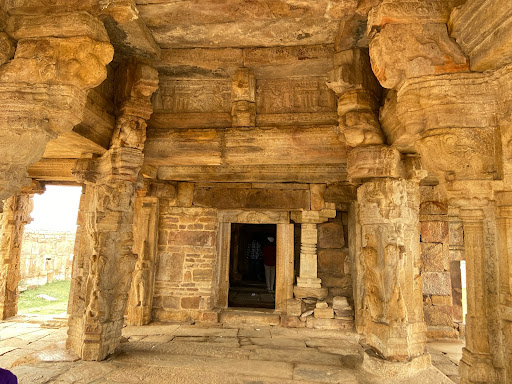The Lepakshi Temple, located in the southern state of Andhra Pradesh, India, is a fascinating testament to ancient architecture and engineering prowess.
Hanging Pillar of Lepakshi Temple Among its many intriguing features, the Hanging Pillar stands out as one of the most enigmatic and awe-inspiring structures. This article will delve into the secrets and mysteries surrounding this marvel of craftsmanship.
1. The Gravity-Defying Illusion
The most striking characteristic of the Hanging Pillar is its apparent defiance of gravity. Visitors to the temple are often left bewildered by the sight of this pillar, which appears to be floating slightly above the ground. However, upon closer examination, it becomes clear that the pillar is cleverly balanced on a minuscule point, giving it the illusion of hanging.
2. The Unyielding Stability
Despite its precarious appearance, the Hanging Pillar has withstood the test of time for centuries. Earthquakes, which are not uncommon in the region, have failed to topple this architectural wonder. The pillars around the Hanging Pillar also remain untouched, proving the genius of the ancient architects who designed the temple.
3. The Discovered Mystery
Historians and archaeologists have long debated the method used to create this gravity-defying pillar. Recent studies have revealed that the ancient artisans used a combination of advanced principles of balance and geometry. Their understanding of the center of mass and distribution of weight allowed them to create a stable structure that challenges modern engineering principles.
4. The Sound Test
Another intriguing aspect of the Hanging Pillar is its acoustic properties. When struck, the pillar produces a resonating sound that fills the air around it. Some believe that the pillar's unique sonic quality was intentionally incorporated into the temple's design, possibly for ceremonial or ritualistic purposes.
5. The Dislodged Pillar
Legend has it that during British colonial rule, an over-enthusiastic British engineer tried to uncover the secret behind the Hanging Pillar. In his attempt, he dislodged the pillar from its balanced position, hoping to unravel the mystery. To his dismay, he couldn't replicate the pillar's original position and stability, and it remains slightly tilted to this day.
6. The Unreachable Ceiling
The Lepakshi Temple boasts intricate and exquisite carvings on its ceilings, but the Hanging Pillar's placement makes it impossible for visitors to touch or admire these masterpieces up close. This inaccessibility adds to the allure of the pillar and fuels the curiosity of those who visit the temple.
7. The Symbolic Significance
Beyond its architectural and engineering brilliance, the Hanging Pillar holds symbolic significance in Hindu mythology. Some interpret it as a representation of Lord Shiva's unmatched power, suggesting that even the laws of physics cannot bind the divine. Others see it as a reminder of the impermanence of life and the need to transcend the material world.
Conclusion
The Hanging Pillar of Lepakshi Temple stands as a timeless enigma, captivating the minds of all who witness its remarkable presence. As technology and knowledge advance, the secrets of this ancient wonder still remain partially veiled. Its allure and the mysteries it embodies continue to make it a cherished destination for history enthusiasts, architects, and spiritual seekers alike.
hanging pillar of lepakshi temple
what is the mystery behind the hanging pillar of lepakshi temple
how many hanging pillars are there in lepakshi temple
science behind hanging pillar of lepakshi
hanging pillar temple in india
what is special in lepakshi temple
hanging pillar of lepakshi temple
how many hanging pillars are there in lepakshi temple
science behind hanging pillar of lepakshi
hanging pillar temple in india
what is special in lepakshi temple





Comments